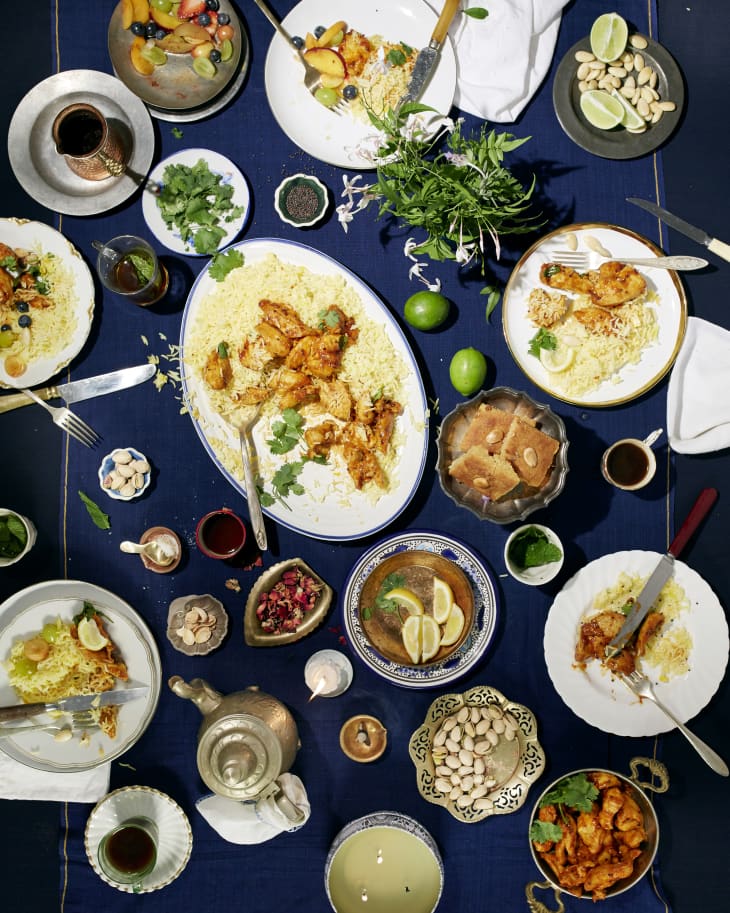5 Common Mistakes to Avoid When Cooking During Ramadan
If you’re an old pro at preparing iftar or this is the first time you’re making it on your own, there are a few considerations that will make cooking during Ramadan smoother. Many of these tips are ones that will help you out after the Holy Month is over, because good kitchen craft stays with you no matter the season.
So from advice on when to do your grocery shopping to some thoughts on the amount of food to prepare, here are a few common mistakes to avoid this year when cooking for Ramadan.
1. Shopping while hungry.
We’ve all been there! You didn’t plan for dinner, it is an hour before the sun goes down, and you don’t have any idea what to make for iftar. You rush to the store and everything looks delicious and ends up in the shopping cart. Not only will you overspend, but you will also likely not have enough time or space to eat all the snacks you just purchased.
Do this instead: Create a weekly meal plan with what you’re going to make for iftar and suhoor. Then list out all the ingredients you need before heading to the grocery story. It is also best to shop first thing in the morning when the risk of hunger-directed purchases are low. This will not only help keep you within your budget, but it may also help eliminate food waste.
You may also want to try a grocery shopping service like Instacart or Fresh Direct. You submit your shopping list and a shopper gathers all your items for you. You either pick up your groceries, or have them delivered right to your door.
2. Making too much food.
It is easy to get caught up in creating too many options for dinner. Not only is it unnecessary, but it also takes away from the essence of the Holy Month.
Do this instead: Stick to a simple dinner breakdown of protein (this is your star), grain/starch (brown rice or quinoa are filling and nutritious), and vegetables (try different seasonings and marinades while roasting). Traditionally, a soup and/or salad (fattoush and lentil soup) are served for iftar. Aside from those additions, keep it simple and have fewer offerings to ensure everything gets eaten!
3. Not repurposing leftovers.
Despite your best plans, you will still end up with leftovers from time to time. It can be a challenge to get creative with leftovers, especially while fasting and feeling fatigued. Repurposing leftovers is a great way to stretch a dish you’ve already prepared, eliminate waste, and not bore yourself and family with the same thing day after day. Soups and stews make great leftovers, as the flavors develop with time and can be stretched over a few days! Rice can also be repurposed and enjoyed at suhoor time with yogurt.
Do this instead: Make your leftovers work for you! It can be as simple as shredding leftover chicken for lentil soup and topping it with yogurt for a dressed-up dish or a complete transformation of leftover quinoa into quinoa cakes. Plan to make recipes for iftar you don’t mind eating in the morning, so the cooking for suhoor is quick to prepare.
4. Making high-fat/high-sodium foods.
Some of the most desirable foods — think samosas and kibbeh— are high in fat and sodium. While delicious, consuming high-sodium foods can lead to dehydration and the high-fat foods might not sit well in during the long, hot summer days.
Do this instead: When planning your menu, think about the nutrients your body needs to get through the day. The summer season brings fruits and vegetables that are at the peak of freshness. A summer salad with grilled chicken is the perfect way to get all the nutrients, minerals, and calories you need, without skimping on flavor!
Recipes to inspire you: 35 Delicious and Filling Dinner Ideas for Iftar
5. Only cooking new or complicated recipes.
During a month when cooking every evening is the norm, experimenting with complicated recipes or unfamiliar ingredients that you can’t taste as you go is not a good idea. Imagine spending four hours cooking Julia Child’s beef bourguignon, only to find that your substitution for red wine separated the sauce and left you with a not-so-tasty dish.
Do this instead: Stick to recipes you are familiar with, or at least recipe that are on the simpler side. If the ingredient list is as long as your prayer list, you should probably choose a different recipe!
Try this recipe: Orzo Summer Salad
